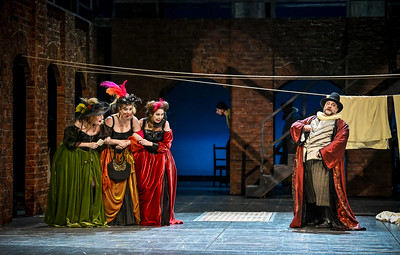Ondřej Havelka returns to the Brno opera stage after a long break and with him comes the comedy opera Falstaff by Giuseppe Verdi. Falstaff returns to the Janáček Opera repertoire after fifty years. The soloists will be Spanish baritone Luis Cansina, Italian baritone Damiano Salerno, Pavla Vykopalová, Václava Krejčí Housková, Markéta Cukrová, Jana Hrochová and others.
The Brno audience knows the Spanish baritone Luis Cansino from Verdi’s dramas Sicilian Vespers and Nabucco. His counterpart will be the Italian baritone Damiano Salerno, whom the Brno audience has also had the opportunity to see as Nabucco. The ones who will win over everyone in this comedy are, of course, the ladies – the soloists include Pavla Vykopalová (Alice), Václava Krejčí Housková together with Markéta Cukrova (Meg Page) and Jana Hrochová (Mistress Quickly). In a proper Italian opera, there must be a young couple in love who fall happily into each other’s arms at the end, in this case Andrea Široká or Doubravka Součková (Nanetta) and Ondřej Koplík or Daniel Matoušek (Fenton). The musical staging is the work of conductor Ondrej Olos. The premiere will take place on Wednesday, 5 April 2023 at 19:00 at the Janáček Theatre.
“From the moment I first sang Falstaff fourteen years ago, I knew that this character and I would go hand in hand for a long time. It’s a perfect role because of its demanding nature: it requires the performer to show all his interpretive and vocal skills. I identify with this character because I don’t like flat characters, but ones that allow a wide range of psychological nuances to be explored. Falstaff is not a comic character. His comicality is due to the situations he himself creates, often unwittingly. Falstaff feels the bitterness of what he was and what he is no longer, he is angry and suffers the traps that are made for him in the course of the plot, he is aware of what his life is really like. He is a fascinating man who, despite his apparent ridiculousness, has managed to rediscover himself and overcome adversity,” says Luis Cansino, who plays Falstaff.
No one expects a comic opera from Verdi, you say? It is true that the first one, which he wrote at the beginning of his career, had a brief life. It took almost fifty years and twenty-five more operas before Verdi returned to humour in opera. We have the librettist Arrigo Boito to thank for this, who, after a successful collaboration on Othello, suggested another Shakespearean theme to the composer – The Merry Wives of Windsor. And so a masterpiece was created, inspired by the famous Shakespearean character – the knight Falstaff, who lives in the Garter Inn. He loves good food and drink, but he’s particularly interested in the local Windsor ladies, Alice Ford and Meg Page. The fact that they’re married doesn’t matter at all, it adds spice to his amorous outbursts, and besides, the knight, who is perpetually low on cash, might get his hands on their husbands’ money. Meg and Alice, however, do not want his favour, so they entangle the distracted, old-fashioned lover in their net with the help of Mistress Quickly and give him a good lesson. But Falstaff concludes the bittersweet comedy with wise words: Everything in the world is a farce. In the end, he’s not the only loser.
“Falstaff is a very demanding opera for the producers. It’s a crowded musical space, brilliantly written music, the instrumentation is masterful, but it’s hard to contain because, for example, there are three plans going over each other or four actors singing different lines at the same time. So it’s complicated to construct everything in a clear way and in a way that the audience perceives it as a comedy. My approach to opera direction is to take the writers as a starting point, to understand why they wrote it the way they did, because it always has a certain period context and context. Respect for the authors is terribly important to me. With these historical operas, I rarely go in with a modern concept – the music simply connects with the period. Our production will be a reminiscence of the late Renaissance, but a little shifted into clowning, into American slapstick. It will be a really nice comedy,” adds director Ondřej Havelka.
Falstaff
Opera in three acts
Music by Giuseppe Verdi
Libretto by Arrigo Boito
Musical direction by Ondrej Olos
Directed by Ondřej Havelka
Scene: Martin Černý
Costumes by Jana Zbořilová
Lighting design by Přemysl Janda
Movement collaboration: Pavol Seriš, Jana Hanušová
Dramaturgy: Patricie Částková
Choirmaster: Pavel Koňárek
Persons and cast:
Sir John Falstaff: Luis Cansino
Ford: Damiano Salerno
Alice Ford: Pavla Vykopalová
Nannetta, their daughter: Andrea Široká / Doubravka Součková
Meg Page: Václava Krejčí Housková / Markéta Cukrová
Mistress Quickly: Jana Hrochová
Fenton: Ondřej Koplík / Daniel Matoušek
Dr. Caius: Berk Dalkiliç
Bardolfo: Vit Nosek
Pistol: Jan Št’ava / David Nykl
Innkeeper: Pavol Seriš
Choir and Orchestra of the Janáček Opera of the National Theatre Brno













No comment added yet..